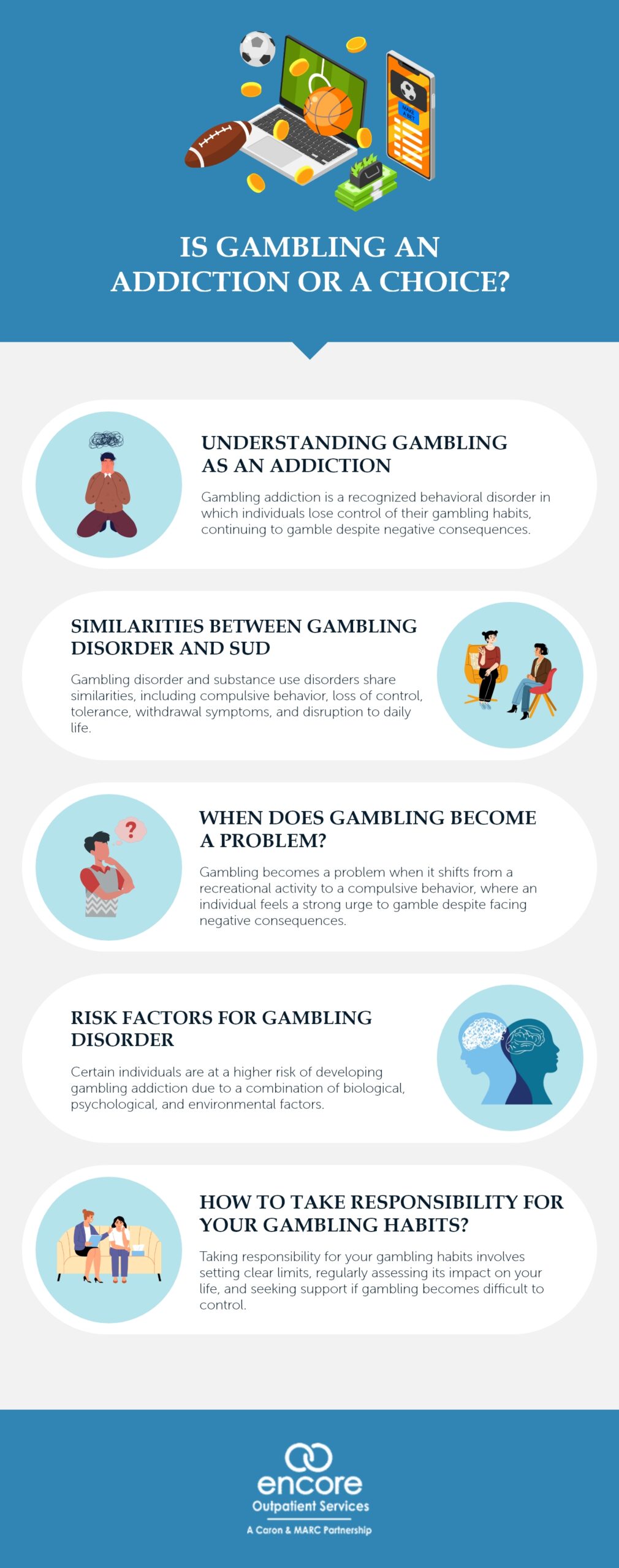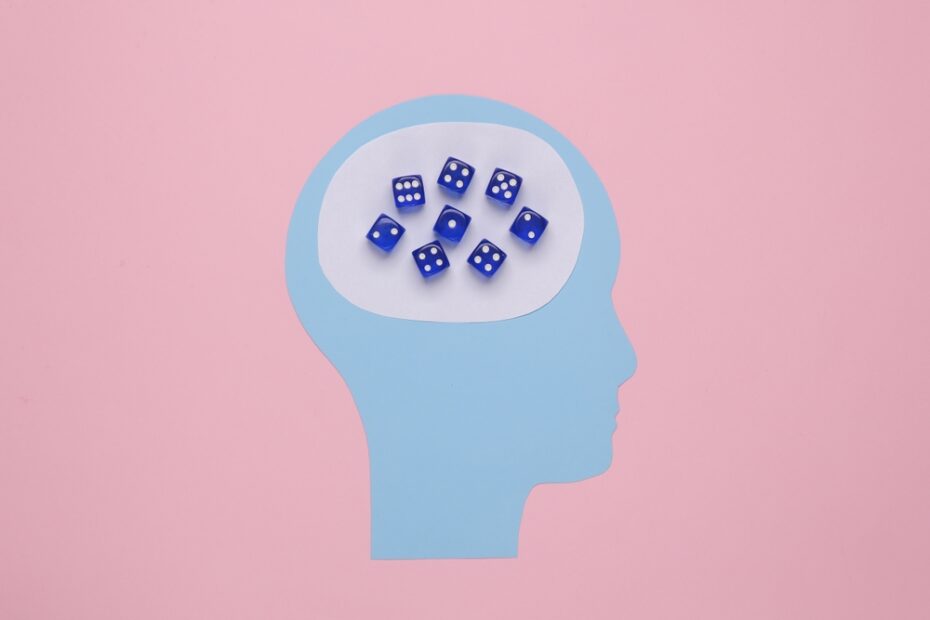Gambling often begins as a choice, with many people viewing it as a fun diversion. However, for some, the decision to gamble can quickly escalate into problematic behavior, especially when it starts to interfere with daily life, finances, or relationships. While gambling is typically seen as a voluntary activity that can be controlled, it’s important to recognize that once it turns into an addiction, it becomes a compulsive behavior driven by factors beyond personal choice.
In this blog post, we will explore how gambling disorder shares similarities with other forms of addiction, the role of personal responsibility, and how external influences can shape gambling behavior. Understanding the balance between choice and addiction is essential to addressing gambling-related challenges and reducing the stigma associated with the disorder.
Understanding Gambling as an Addiction
Gambling addiction, also referred to as gambling disorder, is a condition where individuals lose control over their gambling behavior despite negative consequences. Previously classified as an impulse control disorder, it is now classified as a behavioral addiction in the Diagnostic and Statistical Manual of Mental Disorders (DSM-5), published by the American Psychiatric Association (APA). This reclassification is based on research showing that gambling addiction shares significant similarities with substance use disorders (SUD) in terms of brain activity, behavior, and diagnostic criteria.
Similarities Between Gambling Disorder and Substance Use Disorders
Both conditions share several key similarities in terms of how they affect behavior and brain function. Here are the key similarities:
- Compulsive Behavior: Both gambling disorder and substance use disorders involve a compulsive urge to engage in the behavior despite negative consequences, such as harm to relationships, finances, or well-being.
- Loss of Control: Individuals with both disorders struggle to control their behavior, finding it difficult to stop or cut back even when they want to.
- Tolerance: In both conditions, individuals develop a tolerance, requiring more frequent gambling or larger doses to achieve the same effect or level of excitement.
- Withdrawal Symptoms: Both gambling disorder and substance use disorders can lead to withdrawal symptoms when an individual attempts to stop. Common withdrawal symptoms for both conditions include anxiety, depression, irritability, insomnia, and restlessness.
- Comorbidity: Individuals with gambling disorder and substance use disorders often experience co-occurring mental health conditions. Studies suggest that more than 70% of problem gamblers may have at least one comorbid disorder.
- Genetic and Neurobiological Factors: Both conditions share genetic predispositions and activate the brain’s reward system in similar ways.
- Environmental Factors: Stress, early exposure, peer influence, and ease of access are shared environmental factors that increase the risk of developing either disorder.
- Treatment Approaches: Treatment for gambling addiction and substance use disorders often involves similar approaches, such as cognitive-behavioral therapy (CBT), family therapy, and participation in support groups like Gamblers Anonymous or Alcoholics Anonymous. Both conditions require ongoing support to manage the risk of relapse, which remains high for both forms of addiction.
These shared characteristics highlight the overlapping nature of gambling disorder and substance use disorders, both in how they develop and how they are treated.

When Does Gambling Become a Problem?
Gambling becomes a problem when it shifts from a recreational activity to a compulsive behavior, where an individual feels a strong urge to gamble despite facing negative consequences. This transition often happens gradually.
Key signs of gambling addiction include:
- Preoccupation with Gambling: Constantly thinking about gambling, planning future gambling activities, or reliving past gambling experiences.
- Increased Betting: Needing to gamble with larger amounts of money to achieve the same level of excitement, often taking bigger risks.
- Chasing Losses: Continuously gambling in an attempt to recover money lost in previous gambling sessions, leading to further financial issues.
- Loss of Control: Repeated unsuccessful attempts to cut back or stop gambling, often accompanied by feelings of frustration or restlessness.
- Neglecting Responsibilities: Gambling interferes with daily obligations such as work, school, or family duties, causing disruptions in important areas of life.
- Financial Consequences: Taking out loans, borrowing from friends or family, or selling possessions to fund gambling.
- Hiding Gambling Activity: Lying to family members, friends, or others about the extent of gambling or financial losses.
- Emotional Distress: Using gambling as a coping mechanism for negative emotions like anxiety or stress and feeling guilt or remorse afterward.
- Jeopardizing Relationships: Risking or losing significant relationships, jobs, or educational opportunities due to gambling behavior.
When gambling starts to dominate thoughts, behaviors, and decision-making, leading to harmful consequences, it has moved from a voluntary activity to a serious problem that may require professional treatment.
Risk Factors for Gambling Disorder
Certain individuals are at a higher risk of developing gambling addiction due to a combination of biological, psychological, and environmental factors. Below are key risk factors that contribute to increased vulnerability:
- Genetic Predisposition: Individuals with a family history of gambling problems or other addictions are at greater risk of developing gambling disorders. Genetic traits linked to addiction can be inherited, making some people more susceptible to compulsive behaviors.
- Age: Adolescents and young adults are more likely to develop gambling disorders than other age groups. Research shows that approximately 7% of youths develop a gambling disorder, compared to about 1% of adults. College students also experience higher rates of gambling problems compared to the general population.
- Gender: While gambling disorder has traditionally been more common in men, the gap between genders has narrowed, especially with the rise of online gambling. Women are increasingly participating in various forms of gambling, including strategic card games, bingo, and slot machines.
- Personality Traits: Individuals who are impulsive, easily bored, highly competitive, or struggle with emotional regulation are more at risk of developing a gambling disorder. These personality traits, combined with environmental or social factors, increase vulnerability.
- Psychological Factors: Individuals with mental health conditions, such as depression, anxiety, bipolar disorder, or substance use disorders, are at a higher risk of developing gambling addiction. Gambling may serve as a coping mechanism for negative emotions, creating a cycle of dependency.
- Environmental Influences: Easy access to gambling platforms, especially through online gambling, and social or cultural exposure to gambling activities can increase the risk of developing a gambling disorder.
These factors often interact to create a complex condition that requires comprehensive understanding and treatment.
Consequences of Gambling Disorder
Gambling disorder can lead to a wide range of serious consequences that affect various aspects of an individual’s life. Financial difficulties are one of the most common outcomes, as compulsive gambling often results in significant debt, loss of savings, and even bankruptcy. These financial situations can create a cycle of stress and anxiety, further fueling the urge to gamble in an attempt to recover losses.
The disorder also has a profound impact on personal relationships. As gambling behavior escalates, individuals may become withdrawn, secretive, or deceptive, leading to strained relationships with family and friends. The emotional toll of gambling addiction, such as feelings of guilt, shame, or depression, can further damage relationships and isolate the individual from their support system.
In addition to financial and relational consequences, gambling disorder can negatively affect work or academic performance. The preoccupation with gambling may lead to missed deadlines, absenteeism, or reduced productivity, putting employment or academic standing at risk.
These consequences can severely impact an individual’s overall well-being, requiring comprehensive treatment and support to address the financial, emotional, and social challenges it presents.
How to Take Responsibility for Your Gambling Habits?
Taking responsibility for your gambling habits is an important step in preventing potential problems and maintaining control over your behavior. Start by setting clear limits on both the time and money you spend on gambling activities. Establishing these boundaries in advance helps prevent impulsive decisions and ensures gambling remains a controlled and recreational activity.
It’s also important to regularly assess the impact of gambling on your life. Reflect on whether it’s affecting your relationships, finances, or daily responsibilities, and be honest about any warning signs. If you notice gambling becoming a priority over other important aspects of life, it may be time to reevaluate your habits.
Seeking support from friends, family, or professional resources can also help you stay accountable. Talking openly about your gambling behavior and seeking guidance can provide valuable perspective and support in managing any risks associated with gambling. If you feel that gambling is becoming difficult to control, reaching out to Encore Outpatient Services can be a critical step.
Encore Outpatient Services offers specialized treatment programs designed to help individuals regain control of their compulsive gambling behaviors through tailored support, therapy, and practical strategies. Taking these proactive steps can help ensure that gambling remains a choice, not a compulsion.
Public Perception and Stigma
The public perception of gambling addiction is often shaped by misconceptions, leading to stigma surrounding the condition. Many view gambling addiction as a personal choice or a lack of self-control rather than recognizing it as a behavioral disorder driven by psychological, neurological, and environmental factors. This misunderstanding can prevent individuals from seeking help, as they may fear judgment or be seen as irresponsible.
Stigma can also reinforce feelings of guilt, shame, and isolation among those affected, making it harder for them to admit their struggles and access support. It’s essential to challenge these stigmas and promote empathy, understanding, and compassion. Education and awareness initiatives can play a crucial role in dispelling myths surrounding gambling addiction and fostering a more nuanced understanding of the complexities involved. By sharing personal stories, highlighting the impacts of gambling addiction, and promoting open dialogue, we can reduce stigma and encourage those in need to seek help without fear of judgment.
As a society, we must work towards creating a supportive and inclusive environment for individuals affected by gambling addiction, one that values their dignity, respects their struggles, and offers pathways to recovery and healing. By changing public perception and challenging stigma, we can create a more compassionate and empathetic society for all.
